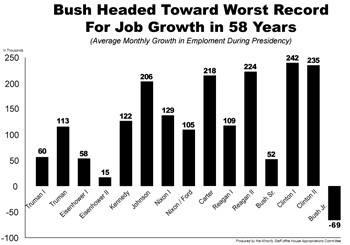GOP policies in Congress and the White House ignore the
jobs
crisis for North American workers and instead focus on
tax cuts
on dividends and other measures that do nothing to
pull the
economy out of recession.For the first time in more than
four decades, Republicans control the White House, the Senate
and the House of Representatives.
This is not good news for working families. The Republican
Party historically has tilted heavily towards the upper classes
and the corporate sector.
Their legislative priorities include tax cuts for the
wealthiest taxpayers and a lengthy list of favors for Corporate
America.
"There's nothing there for working men and women," noted IAM
President Tom Buffenbarger. "In the last Congress, President
Bush and his allies on Capitol Hill passed a trillion-dollar tax
cut for the rich, turned the budget surplus into a record
deficit and sent the economy into a tail spin.
"The Bush administration's proposal to erase the tax on
dividends won't create a single new job nor will it slow down
the growing export of our jobs, capital and technology to
low-wage countries around the globe," Buffenbarger declared.
With all branches of government firmly in GOP hands, working
families have few allies.
House Speaker Dennis Hastert's support for working family
issues is lackluster, at best. He has voted against worker
issues, including retirement security for the nation's senior
citizens, prescription drugs under Medicare and fair tax
policies for all citizens.
Hastert helped ram through Fast Track trade legislation that
has eroded America's industrial base.
New House Majority Leader Tom DeLay of Texas, a
fire-breathing and unapologetic conservative, drew blistering
criticism for his ill-tempered attack on union members in a
fundraising letter for the National Right-to-Work Legal Defense
Fund.
DeLay blamed a staff aide for the letter, which went out over
DeLay's signature and on his Majority Leader stationary.
That off-the-wall effort had congressional Republicans
scurrying for cover just as the House had begun debate on an
Omnibus-spending bill.
On the Senate side, Majority Leader Bill Frist takes on the
top job with little concern for working families. He voted
against extending jobless benefits for unemployed workers and
joined a Republican filibuster that killed tax rebates for
low-income workers, as well as increased Medicaid funds for
states.
Frist supported Fast Track trade bills and endorsed repeal of
the estate tax, a measure that pays hefty dividends to the
richest one percent of taxpayers.
The current law exempts estates worth up to $1 million
meaning few workers ever have to worry about this tax.
Working families need a different set of legislative
priorities. The fairest and most effective way to reverse the 22
months of lay-offs and industrial decline is with an economic
expansion program designed to help those hardest hit by the
downturn, create good jobs and improve wages and benefits for
all working families.
Workers are not without political allies on Capitol Hill.
Despite the more anti-worker tilt in this Congress, there are
those who stand with working families and fight attempts to
weaken hard-won worker protections such as job safety and health
measures.
Senator Edward M. Kennedy, D-MA, sharply criticized the White
House agenda and warned that his fellow Democrats "must stand up
and speak out" for their core principals. He pointed out that
"not one of the Democratic senators who opposed" Bush's $1.35
trillion tax cut lost re-election bids.
Kennedy and his Democratic colleagues have their hands full
with the new GOP leadership.
